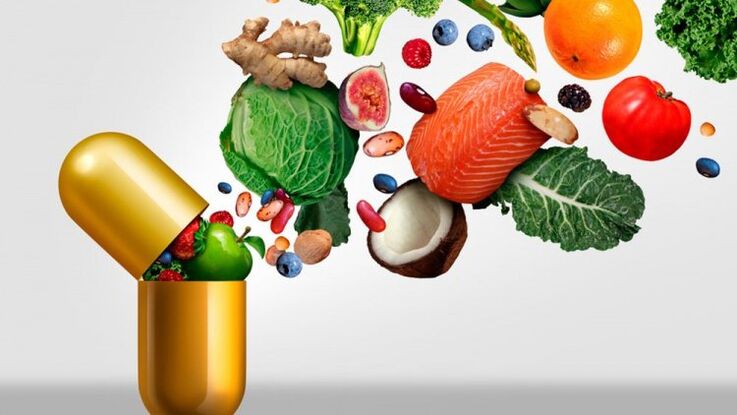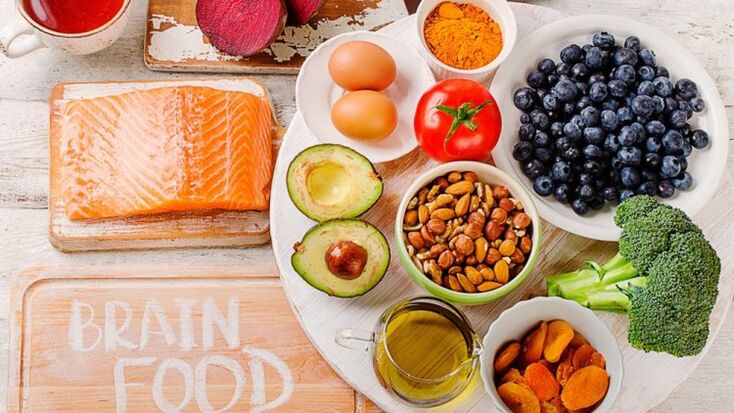Insufficient vitamin content in the human body will negatively affect brain activity and cause cognitive dysfunction. The main signs of vitamin deficiency are loss of ability to perceive and remember information, decreased concentration, forgetfulness, absent-mindedness, lethargy, fatigue, and bad mood.
To prevent this, take vitamins regularly and add foods that can improve brain function in your diet.
What is the role of vitamins
The root of the word "vitamin" means life. In fact, the body's ability to work normally and efficiently depends on the organic substances we absorb from food.
Vitamins help the body perform the following functions:
- They produce collagen, which can enhance and improve the stiffness and elasticity of tissues (including blood vessel walls). This leads to improved blood formation and nourishes the brain.
- Promote the acceleration of redox reactions, thereby increasing metabolism and releasing energy from protein, fat, and carbohydrates.
- They have antioxidant properties that can prevent the destruction of cells by the products of biochemical reactions.
In order to keep the brain working actively, it is necessary to constantly monitor the balance of vitamins and minerals. And in the case of deficiency, by choosing the right food and taking vitamin complexes containing various low-molecular-weight organic compounds to replenish vitamin reserves.
What vitamins does the brain need

With age, cognitive brain dysfunction becomes more common. Among the reasons for this situation are endocrine disorders (thyroid, metabolism), digestive system disorders, frequent stress, and excessive physical activity that requires a lot of energy expenditure. In this case, vitamins should come to the rescue. Among the many, the main factors that ensure the effective work of the brain can be singled out. These include:
Β-CAROTENE
Orange-yellow pigment, which can be converted into vitamin A. Protect brain cells, prevent loss of cognitive function, and promote the development of memory. Insufficient pigment can threaten the pathology of the visual organs and have a negative impact on the growth and development of children.
Vitamin B
They are represented by a whole, each of which is very important to the human body:
- Thiamine (B1) helps carbohydrates absorb and store energy, its deficiency will destroy the digestive system;
- Riboflavin (B2) promotes effective oxygen absorption, relieves fatigue, and provides energy for the body;
- Niacin (B3)-a powerful antioxidant that can dilate blood vessels and is suitable for impaired blood supply;
- Pantothenic acid (B5)-participates in the metabolism of protein, fat and carbohydrates, synthesizes acetylcholine, and helps transmit nerve impulses to the brain;
- Pyridoxine (B6)-produces hormones responsible for cognitive processes and synthesizes enzymes that break down proteins, which is necessary for the creation of new cells;
- Folic acid (B9)-Promote cell reproduction. Pregnant women need the formation of serotonin, adrenaline and dopamine to promote the development of pregnant fetuses;
- Cyanocobalamin (B12)-reduces bad cholesterol, strengthens blood vessel walls, and participates in the synthesis of amino acids and DNA.
Ascorbic acid (vitamin C)
It prevents the degeneration of brain cells and helps the glands to be absorbed better. Used in combination with tocopherol to treat pathologies related to impaired blood supply and reduce the risk of malignant tumors.
Calciferol (vitamin D)
It activates the assimilation of phosphorus and calcium, which are part of brain cells, and improves cognitive ability (memory, concentration) and mood. The lack of such organic compounds has become the cause of the development of cognitive impairment.
Vitamin K
It is represented by a group of fat-soluble compounds-phylloquinone (K1) and menaquinone (K2), which are responsible for blood vessel and blood clotting functions. Thanks to him, calcium is easier to absorb. The shortage threatens blood vessel blockage, the development of amnesia, and the destruction of hematopoietic function.
Tocopherol (Vitamin E)
As a powerful antioxidant, it can protect nerve cells from toxins and free radicals, improve memory, and delay aging.
Polyunsaturated fats-so-called omega-3 fats-also have an effect on improving brain performance. They affect neuroplasticity, increase concentration, and reduce the risk of Alzheimer's disease.
Foods that improve brain function

The main activity of the brain is to deliver commands to perform important functions of the body. In order to maintain good coordination, he needs good nutrition. The food consumed should contain useful vitamins and minerals.
The following is a list of healthy foods that are good for the brain that you need to regularly include in your diet:
- Nuts (walnuts, pine nuts, almonds): Contain polyunsaturated acids, vitamins B1, B2, C, carotene, as well as iron, iodine, magnesium, zinc, etc. , to prevent premature aging of the body and activate the brain.
- Berries (blueberries, blackberries, cranberries, strawberries): improve memory and vision, prevent heart and blood vessel diseases, and improve efficiency.
- Eggs (chicken, quail): rich in lutein, can prevent the development of heart disease and stroke. The doctor recommends taking no more than 2 tablets per day.
- High-quality dark chocolate: moderately stimulate brain activity, improve oxygen supply, and expand blood vessels. The magnesium and phosphorus contained therein contribute to the nutrition of the cells.
- Carrots: inhibit aging by preventing the destruction of brain cells.
- Beetroot: increase blood flow to the brain and help improve mental performance.
- Seaweed: Contains iodine, which helps fight irritability, insomnia, depression, and amnesia.
- Fatty sea fish (mackerel, salmon, tuna): a source of omega-3 polyunsaturated fatty acids-good for the brain.
- Chicken, turkey, beef: contains protein, selenium and vitamin B.
- Spinach: a real storehouse of vitamins A, C, K and iron-preventing the development of heart attacks and strokes.
- Beans (lentils, beans): Provide a clear mind and speed of thinking.
In order to organize all the functions of the brain, it is necessary to follow the recommendations of nutritionists:
- Don't overeating-excessive food will lead to the formation of free radicals, which has an adverse effect on brain cells;
- Eat very few portions-5-6 meals a day;
- Fish in the diet should be at least 3 times a week;
- Complex carbohydrates, fresh vegetables and fruits should be consumed until 16: 00 every day;
- Quit alcohol, caffeine, high-fat foods, sweets and flour products.
Compliance with work and rest programs, an active lifestyle, a balanced diet, and intake of vitamin and mineral complexes will keep the brain healthy for a long time.








































































